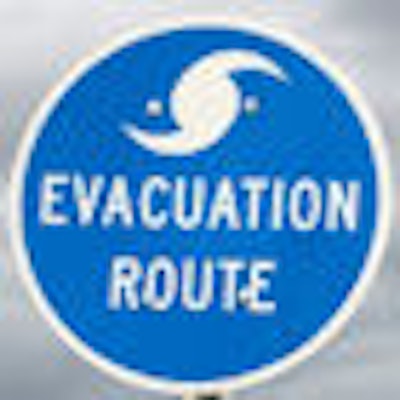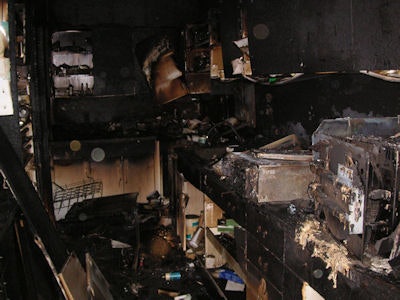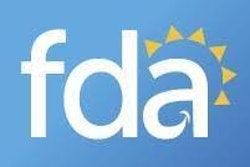
When Hurricane Katrina ravaged the Gulf Coast three years ago, Ray Unland, D.D.S., and his family were forced to flee New Orleans, leaving behind their home and the dental office where he had practiced for 24 years. It would be two weeks before they would see either again and three months before he could reopen his practice in Jefferson Parish, where much of the worst flooding took place.
"For the most part, I didn't work for three months," he said. "My office was fine, but there was roof damage in the building and leaks, which led to a lot of mold damage in other offices. So they had to shut down the whole building."
|
Disaster planning tips September is National Preparedness Month. The campaign's motto -- "Get a kit, make a plan, be informed, and get involved" -- applies to any natural disaster or event, not just hurricanes. Here are some tips to consider in preparing for an emergency or disaster:
For more information on planning for, and recovering from, disasters and emergencies:
|
Through such difficult experiences, dentists like Dr. Unland have solid advice that could help your practice survive disasters large and small (see "Disaster planning tips"). A 2004 article on "Emergency preparedness in the dental office" in the Journal of the American Dental Association noted that "the key issue is that families, dental offices, and communities should plan ahead.... The most important step in coping with an emergency is to discuss the various alternatives with dental office staff members and create a written response plan" (JADA, November 2004, Vol. 135:11, pp. 1565-1570).
In the months following Katrina, Dr. Unland kept in touch with his staff via e-mail and phone, and made sure they got their paychecks. He also got the phone company to set up a central mailbox so that when patients called his office they heard a recording that said he was still in town and still in business, and then gave patients his cell phone number for emergencies.
"I had about 1,000 active patients back then [when Katrina hit]," he said. "I probably lost about 25% to 30% of them, from them moving away and so forth. Although at first when we reopened, we were really busy. We were one of the few dental offices that reopened early on."
When Hurricane Gustav slammed into New Orleans three weeks ago, Dr. Unland used the lessons he learned from Katrina to be better prepared. Although he and his family once again had to evacuate, they headed to Hattiesburg, MS, avoiding the major highways and traffic jams. After two days there -- during which time they communicated with family, friends, and office staff via e-mail and telephone -- they returned to New Orleans to find their house and his office had been spared structurally this time. He was able to reopen a couple of days later.
"We had no power at my house or office [when we first returned], but I have a built-in generator now," he told DrBicuspid.com. "This was my major preparation [after Katrina], along with storm shutters or storm glass on all the windows."
Because the generator had been hooked up directly to the electric panel -- something an electrician can do -- it comes on automatically when the power goes out, he added.
"This way you don't have a bunch of extension cords running all over the place," Dr. Unland said. "It's a small thing that anyone can do that makes the whole experience more tolerable."
He also recommends putting all office and patient data on a single server that you can unplug and take with you in case of emergency. And of course, backing up your data offsite is critical.
"Bringing the server with you is the ultimate safety factor, but after Katrina we also started doing multiple backups of our data," Dr. Unland said. "There are easy ways to do it offsite that only have minimal costs. I back up all data from the office to my home computer, which is on the second floor of our house. I also have easy-to-use software that backs up to a portable hard drive."
In addition, he had his practice management software installed directly on the server. That way, if he has to leave the office in an emergency and takes the server with him, he can still use the software.
"While we have multiple backups of our data, we decided the best backup is to unplug our server and evacuate it with us," Dr. Unland said. "This way we can access our patient data and work out future appointments."
'We were lucky'
Protecting patient records is "a reality you should take very seriously," agrees Bradley Dykstra, D.D.S. His office in Hudsonville, MI was destroyed by a fire in April, and he is still operating in a temporary office. In fact, it will be at least three more months before he is able to move back into his original office, he told DrBicuspid.com.
"None of us think when we walk out the door in the evening that we'll never see the office again," he said.
 |
|
Dr. Bradley Dykstra's office in Hudsonville, MI, after the April 11 fire. |
"It is a reality that the longer a practice is closed, the more severe the long-term economic consequences will be," he wrote in a recent article (Dental Economics, August 29, 2008).
Because all patient and practice records for the last five years had been digitized and backed up in a remote location, all the data survived the fire. This was a significant factor in being able to have a temporary front desk up and running just a day after the fire. Dr. Dykstra was able to start seeing patients one week later.
"Almost anything we could do in our previous office, we can do in our new office -- just not [as] much of it," he wrote, adding that he has extended his office hours to best meet the needs of his patients. "Office production is about 50% to 60% of what it was, but new patients, emergencies, urgent work, and preventive recare appointments are taken care of in a timely manner."
While no one can really protect themselves from something like a fire or other disaster, Dr. Dykstra said, there are steps any dentist can -- and probably should -- take to make life easier if something like this does occur.
"First, preserve your patient data," he said. "If you lose it, you are in a very bad situation. It leaves you in a legal vacuum if the patient were to ever bring a suit against you. Also, know what you have in terms of equipment, inventory, supplies, etc. Take a photo of every wall, every room, with every closet and cabinet door open. This is for insurance purposes, to help jar your memory. And have a visit with your insurance agent to make sure you are well-covered."
Five months after the fire, Dr. Dykstra considers himself "very lucky" -- 90% of the equipment and supplies in his office were still identifiable, the structure of the building was still intact, and no patient data was lost. Construction on the new office is coming along, and they have incorporated some features into the design as a direct result of the fire.
"The network server will be in its own fireproof room," Dr. Dykstra said. "Also, we will have better inventory control numbers because we will know exactly how much of everything we have, when it was bought, the purchase price, model numbers, etc."
Some items, however, are irreplaceable.
"The data was backed up and secure, so we were prepared on that front," he said. "But we lost many personal things, like pictures, plaques, trophies ... there are things in my personal office that are just gone."



















